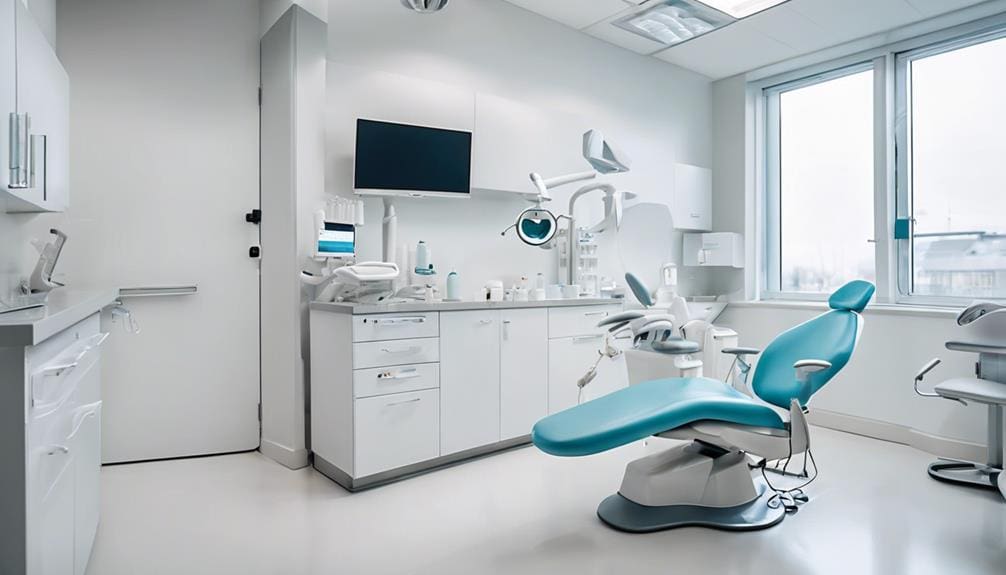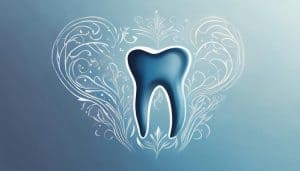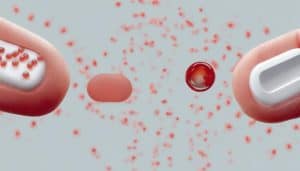When you schedule a dentist appointment, you can expect the visit to last anywhere from 30 minutes to several hours, depending on the type of procedure or treatment you require. Routine checkups and cleanings usually take around 30-45 minutes, while more involved procedures like cavity fillings or broken tooth repairs can take up to an hour. Factors like your dentist's schedule, oral health needs, and the type of procedure will all impact the length of your appointment. Finding out more about what to expect can help you plan and prepare for your visit.
Key Takeaways
• A routine dental checkup and cleaning typically takes 30-45 minutes, but may vary based on individual oral health needs.
• Dental procedures like cavity fillings, repairing broken teeth, and periodontal disease treatment can take anywhere from 20 minutes to 2 hours.
• Emergency dental appointments prioritize urgent cases, with waiting times varying based on the level of urgency.
• The duration of oral surgery appointments ranges from 30 minutes to several hours, depending on the procedure's complexity.
• Factors like the dentist's schedule, individual oral health needs, and different dental procedures can affect the overall appointment time.
Typical Appointment Length
When you schedule a thorough dental checkup and cleaning, you can expect the appointment to last around 30-45 minutes, depending on your individual oral health needs and any specific issues that require attention. This is a typical appointment length for a standard dental appointment. During this time, your dentist will assess your oral health, clean your teeth, and provide personalized recommendations for improvement.
If X-rays are needed, you can add an additional 15 minutes to the appointment time. For a more detailed visit, the total appointment duration can be around an hour. However, the length of the appointment can vary based on your unique oral health needs and any specific issues that need to be addressed.
Regular dental checkups are essential for preventing dental issues and maintaining overall oral health. By understanding what to expect during your dental appointment, you can feel more prepared and confident in taking care of your teeth.
Factors Affecting Appointment Time
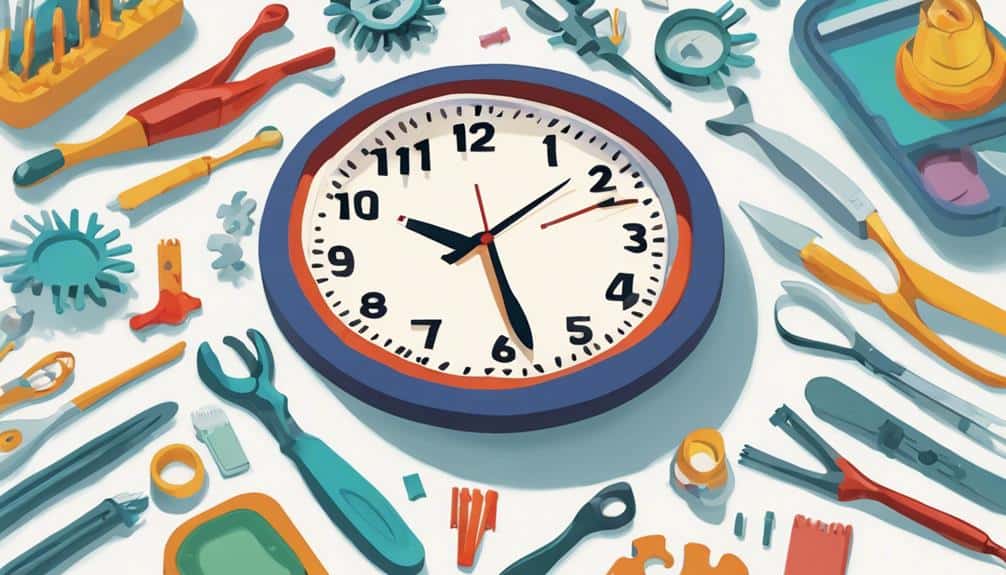
Multiple factors, including the type of procedure, your dentist's schedule, and your individual oral health needs, can greatly influence the duration of your dental appointment.
When you schedule a dental appointment, you might wonder how long it'll take. The truth is, it depends on several factors. Here are a few: First, the type of appointment you have scheduled will dictate the length of your visit. A routine cleaning typically takes about an hour, while a more involved procedure like a root canal or crown may take longer. The condition of your teeth and gums will also play a role in determining the length of your appointment. Additionally, any unexpected issues that arise during your visit could extend the time needed for your treatment. As with any dental procedure, it’s important to follow your dentist’s instructions and be aware of the dangers of swallowing mouthwash.
- Your dentist's schedule: If your dentist has a packed schedule, your appointment might be shorter to accommodate other patients.
- Your individual oral health needs: If you have complex oral health issues, your appointment may take longer to address them properly.
- The type of dental procedures: Different procedures, such as cleanings, fillings, or crowns, require varying amounts of time.
These factors can significantly impact the amount of time you spend in the dentist's chair. Understanding these factors can help you plan your schedule accordingly and make the most out of your dental appointment.
Type of Dental Procedure
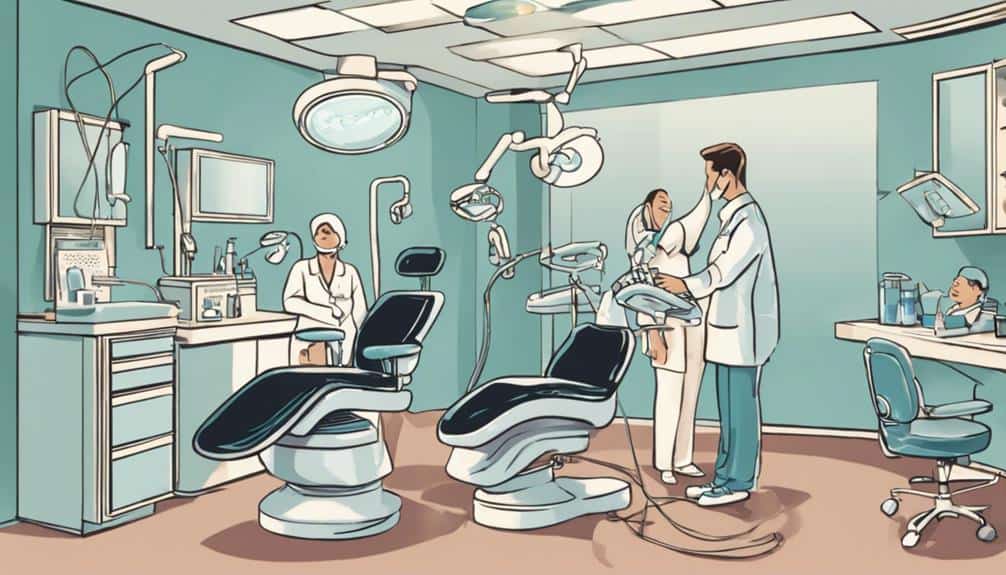
The type of dental procedure you need will greatly impact the length of your appointment, with varying requirements ranging from a quick 20-minute filling to a more extensive 2-hour periodontal treatment. Depending on the complexity of the treatment, you can expect different time commitments.
For instance, if you need a cavity filling, you'll likely spend around 20-60 minutes in the dentist's chair. On the other hand, repairing a broken or chipped tooth can take anywhere from 30-60 minutes.
If you're dealing with periodontal disease, you may need to set aside 1-2 hours for scaling and root planing. It's essential to understand that each dental procedure has unique time requirements, and your dentist will be able to provide a more accurate estimate of your appointment time based on your specific needs.
Routine Checkup and Cleaning
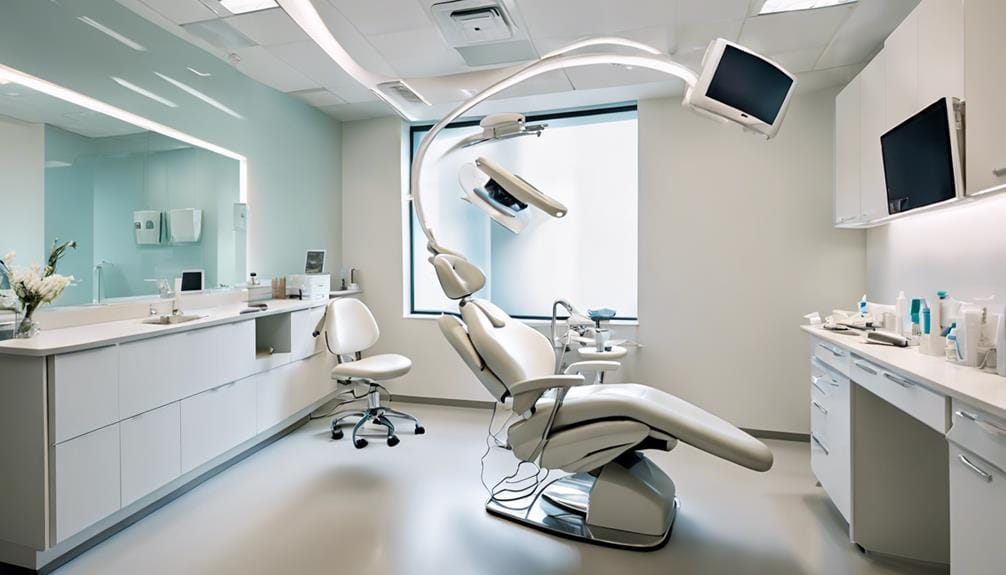
Your routine dentist appointment, an essential investment in your oral health, typically unfolds over a 30-45 minute timespan. This vital dental visit allows your dentist to assess your oral health and identify any potential issues before they become major problems.
During this appointment, you can expect the following:
- A thorough examination of your teeth and gums to detect any signs of tooth decay or gum disease
- A professional cleaning to remove plaque and tartar buildup, preventing gum disease and tooth decay
- A review of your oral hygiene habits and personalized recommendations for improvement
Cavity Filling Procedure Time
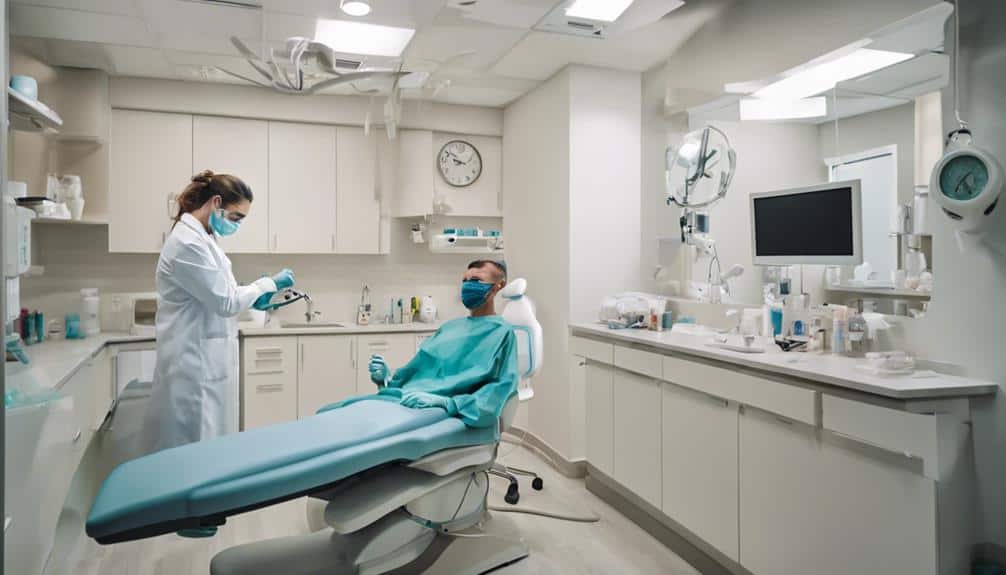
When you're scheduled for a cavity filling procedure, you'll likely spend some time preparing for the treatment.
You'll need to decide on the type of filling material that's right for you, and your dentist will need to prepare the affected tooth.
Depending on your specific needs, this preparation time can vary, but it's an essential step in ensuring a successful and long-lasting filling.
Filling Preparation Time
You'll typically spend around 20 minutes to an hour in the dentist's chair for a cavity filling procedure, depending on the complexity of the filling preparation. The duration of the procedure can vary depending on factors such as the size and location of the cavity. For instance, if you require a root canal treatment, it may extend the cavity filling procedure time.
Here are some key factors that can affect the filling preparation time:
- The size of the cavity: Larger cavities may require more time to fill, while smaller ones can be filled more quickly.
- The location of the cavity: Cavities in harder-to-reach areas, such as molars, may require more time and effort to fill.
- The complexity of the filling: If the cavity is deep or has multiple roots, it may require more time to properly fill and restore the tooth.
Properly filling a cavity is important in preventing further decay and oral health issues. By catching cavities early through regular dental visits, you can minimize the filling preparation time and ensure a quicker, more efficient procedure.
Filling Material Options
The type of filling material chosen for your cavity filling procedure can greatly impact the overall duration, with composite resin fillings typically taking less time to place than amalgam or ceramic alternatives. As you consider your dental care options, it's essential to understand the implications of each filling material on the procedure's length.
Composite resin fillings, for instance, are generally quicker to apply, often taking around 20-30 minutes per tooth. Amalgam fillings, on the other hand, may require a bit more time, typically ranging from 30-45 minutes per tooth. Ceramic fillings, being more complex, can take the longest, sometimes up to an hour or more per tooth.
When choosing a filling material, consider factors such as durability, aesthetics, and cost. By selecting the right filling material for your needs, you can optimize your dental care experience and minimize the time spent in the dentist's chair.
Periodontal Disease Treatment Time
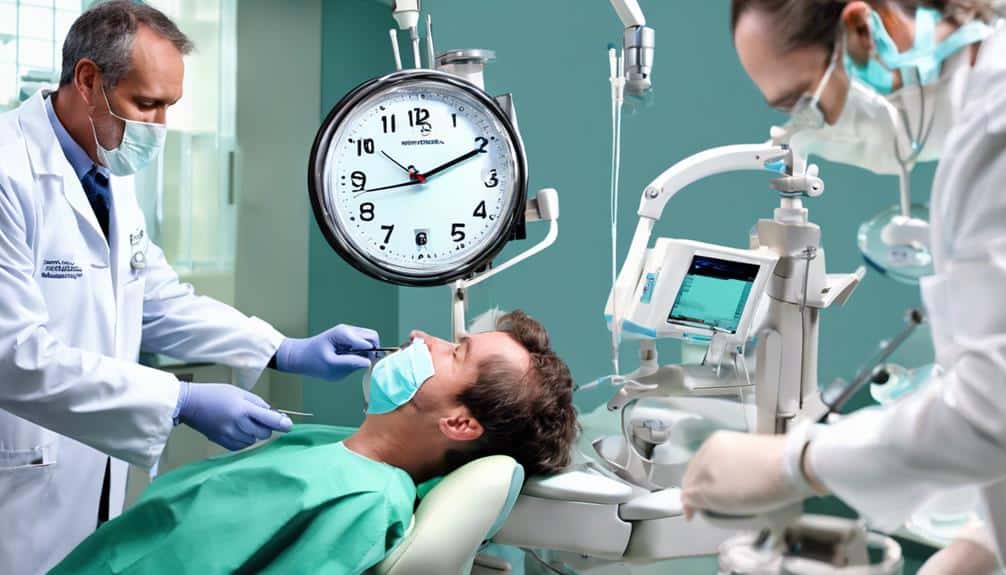
When you're undergoing periodontal disease treatment, you'll likely want to know how long each session will take.
The length of your treatment session will depend on the type of procedure you're receiving, with scaling and root planing typically taking around 1-2 hours, and flap surgery usually lasting around 2 hours.
As you prepare for your appointment, understanding the duration of each treatment option will help you plan and manage your time effectively.
Treatment Session Length
During periodontal disease treatment, your dentist or hygienist will typically allocate a specific time frame for each session, depending on the severity of your infection. The duration of periodontal disease treatment sessions varies based on the severity of the infection.
Here's what you can expect:
- Scaling and Root Planing for gum disease treatment typically takes 1-2 hours.
- Flap Surgery, another treatment for gum disease, lasts about 2 hours.
- Grafting procedures for periodontal disease treatment usually take around 1 hour.
Seeking professional treatment for periodontal disease helps prevent its progression and maintains oral health. By understanding the time commitment required for each treatment session, you can better plan and prepare for your appointments. Your dentist or hygienist will work with you to develop a personalized treatment plan, ensuring you receive the care you need to overcome gum disease and achieve optimal oral health.
Root Planing Duration
Root planing is an important step in periodontal disease treatment. It will take around 1-2 hours to complete, depending on the severity of your infection and the number of affected teeth.
As you prepare for your appointment, it's important to understand that the duration of root planing can vary greatly. If you have a mild case of periodontal disease, the treatment might be shorter, whereas more severe cases may require longer sessions.
During the procedure, your dentist will thoroughly clean the affected teeth and surrounding tissues, removing plaque, tartar, and bacteria that cause gum inflammation. This deep cleaning process is vital in preventing the progression of gum disease and promoting healthy gums.
Keep in mind that your dentist may need to schedule multiple appointments to complete the root planing, depending on the extent of the infection. Be prepared to dedicate a few hours to this important treatment, and rest assured that it's a critical step in maintaining your oral health.
Scaling Time Frames
You can expect scaling to take around 1-2 hours, depending on the extent of plaque and tartar buildup on your teeth. This dental treatment is an important step in addressing periodontal disease, and the duration may vary based on the severity of the infection.
Here's what you can expect from other periodontal disease treatments:
- Flap surgery: typically lasts around 2 hours
- Grafting procedures: generally take about 1 hour to complete
- Scaling and root planing: can take between 1 to 2 hours
It's essential to seek professional treatment for periodontal disease to prevent its progression and maintain oral health. Neglecting to address this issue can lead to more severe problems, including the need for oral surgery.
Emergency Dental Appointments

When severe oral pain or a broken tooth strikes, emergency dental appointments are quickly arranged for the same day to provide immediate relief and address urgent issues. You can expect to receive urgent care promptly, as dental offices prioritize patients experiencing severe oral pain or broken teeth. Their goal is to accommodate you quickly and provide timely treatment.
Here's what you can expect from emergency dental appointments:
| Urgency Level | Waiting Time | Priority |
|---|---|---|
| Severe Oral Pain | Less than 1 hour | High Priority |
| Broken Tooth | 30 minutes to 1 hour | High Priority |
| Abscess or Infection | Less than 1 hour | High Priority |
| Mild Oral Discomfort | 1-2 hours | Medium Priority |
| Non-Urgent Issues | 2-3 hours | Low Priority |
As you can see, emergency dental appointments are designed to provide swift relief for urgent cases. Dental offices aim to minimize waiting time, ensuring you receive the care you need quickly and efficiently. By prioritizing urgent cases, you can expect to receive timely treatment and address your oral health concerns promptly.
Broken or Chipped Tooth Repair
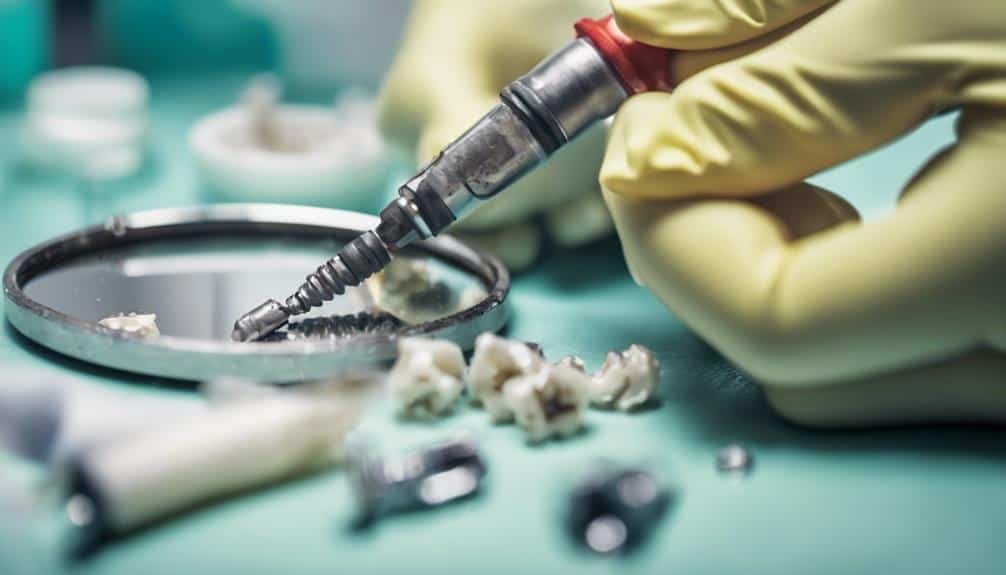
If you've experienced a broken or chipped tooth, prompt repair is essential to prevent further damage and potential infection. A dental appointment can typically provide a quick solution. Fixing a chipped tooth usually takes 30-60 minutes during a dental appointment, making it a relatively quick process.
When you visit your dentist, they'll assess the damage and recommend the best course of action. This might involve dental bonding to restore your chipped tooth efficiently, inlays or onlays for more extensive repairs, which may require multiple appointments, and regular dental care and check-ups to maintain oral health and address tooth damage promptly.
Oral Surgery Appointment Time
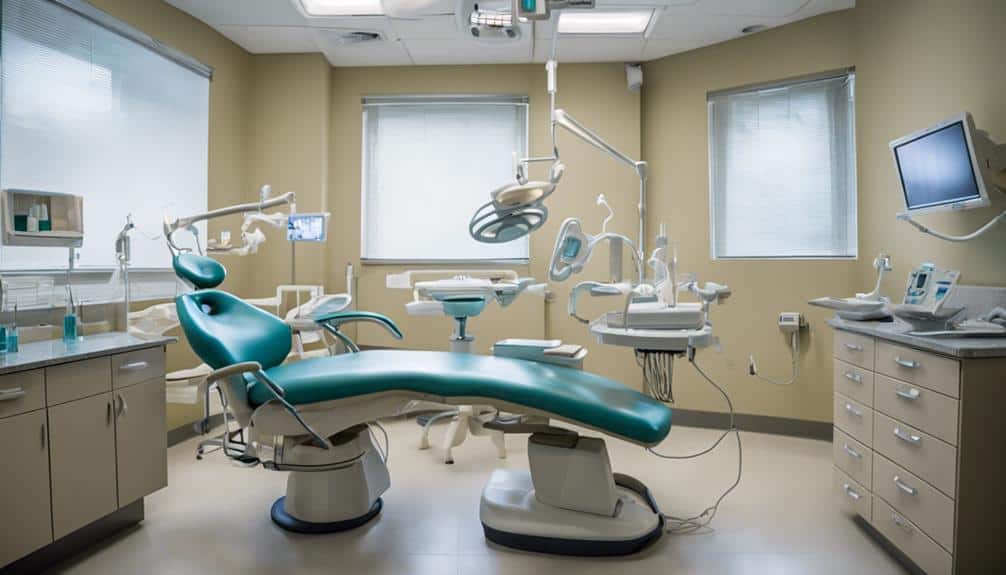
Oral surgery appointments, which often involve complex procedures like dental implant placement, root canals, and tooth extractions, typically require a longer time commitment, ranging from 30 minutes to several hours, depending on the specific procedure and individual case complexity.
During an oral surgery appointment, you can expect to spend around 60-90 minutes for dental implant placement. Root canal treatments, on the other hand, can take anywhere from 30-90 minutes, depending on the complexity of the case. Tooth extractions, being a more variable procedure, can take anywhere from 30 minutes to several hours, depending on the difficulty of the extraction.
Keep in mind that additional time will be needed for anesthesia administration and post-operative care instructions.
Oral and maxillofacial surgeons, who perform these procedures, will make sure that you're comfortable and informed throughout the process. Understanding the time commitment required for your oral surgery appointment will help you plan accordingly and make the most of your time.
Dentist Scheduling and Wait Time
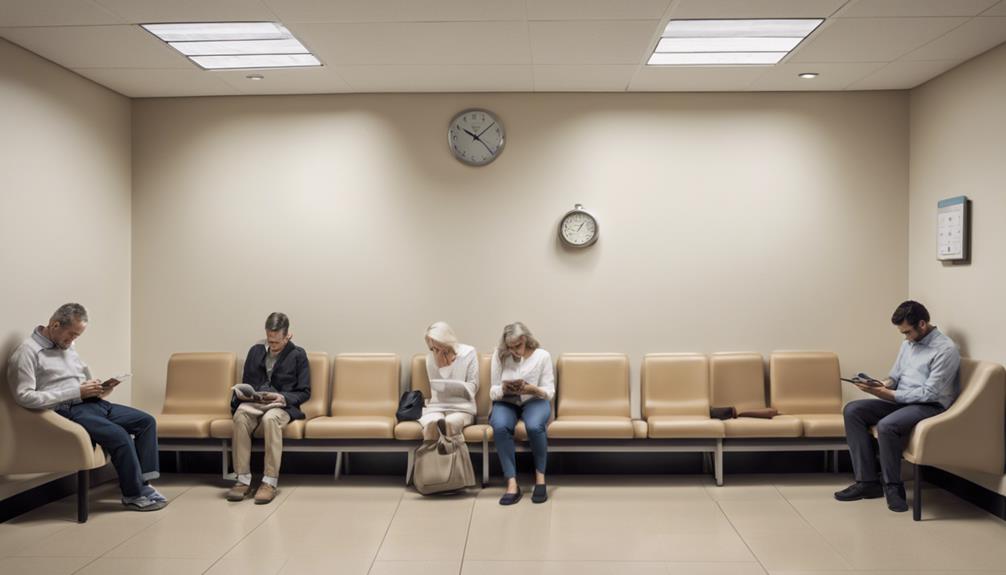
When you schedule a dentist appointment, you're probably wondering how long you'll have to wait. On average, you can expect to wait around 7-8 minutes in the waiting room before being seen.
However, your wait time may vary depending on the office's efficiency and any unforeseen challenges that may arise.
Scheduling Dental Appointments
Scheduling a dental appointment typically takes just a few minutes, but it's important to plan ahead, as you'll likely wait about six days before your visit. When you schedule an appointment, you can expect a brief wait time of around 7-8 minutes once you arrive at the dental office. However, this can vary depending on the day's schedule.
Here are a few things to keep in mind when scheduling your appointment:
- Emergency cases, such as broken teeth or severe oral pain, are prioritized for immediate attention, minimizing waiting time.
- Dental offices aim to accommodate urgent cases quickly, with emergency cases seen without lengthy waiting periods.
- Efforts are made to minimize waiting time for patients, but unforeseen challenges may sometimes cause delays.
Average Wait Times
On average, you can expect to wait around 7-8 minutes in the dental office before being seen by a dentist, a relatively short wait time considering the importance of your dental health. This brief waiting time is a proof of the efficiency of dental offices in managing their schedules.
In fact, you'll typically wait about 6 days before your scheduled dental appointment, which is a reasonable waiting period for non-emergency cases. However, if you're experiencing a dental emergency like a broken tooth or severe oral pain, you can expect immediate attention. Dental offices prioritize urgent cases, minimizing waiting periods to ensure you receive prompt care.
When you schedule a dental appointment, you can expect an average waiting time of around 6 days before your visit. This allows the dental team to prepare for your appointment and provide a smooth experience. By understanding the average wait times, you can plan accordingly and make the most of your dental visit.
Office Efficiency Matters
To guarantee a seamless experience, dental offices prioritize efficiency in their scheduling, carefully managing their daily schedules to minimize wait times and accommodate urgent cases.
As you prepare for your dentist appointment, you might wonder how offices optimize their schedules to ensure a smooth experience. The answer lies in their commitment to office efficiency.
Here's how dental offices streamline their operations:
- Scheduling strategies: Offices stagger appointments to avoid congestion, allowing for a more efficient use of time and minimizing waiting time.
- Prioritizing urgent cases: Dental offices prioritize emergency cases, such as broken teeth or severe oral pain, to make sure prompt attention and reduce waiting time.
- Streamlined operations: By optimizing their daily schedules, dental offices can reduce waiting time, allowing you to receive timely care and attention.
Pre-Appointment Preparation Time

Before you arrive at the dentist's office, preparation time is important to guarantee a smooth appointment. You can expect to spend around 15-30 minutes filling out paperwork and completing any necessary forms. This pre-appointment preparation time is essential in making sure that your dental office visit runs efficiently.
During this time, you'll typically fill out medical history forms, provide insurance information, and review any necessary consent forms. This preparation time also allows the dental office staff to review your information and prepare for your appointment.
By arriving early and completing these tasks, you'll help minimize delays and ensure that your appointment starts on time. Remember, this pre-appointment preparation time is a crucial step in ensuring a successful and stress-free dental appointment.
Time Required for X-Rays
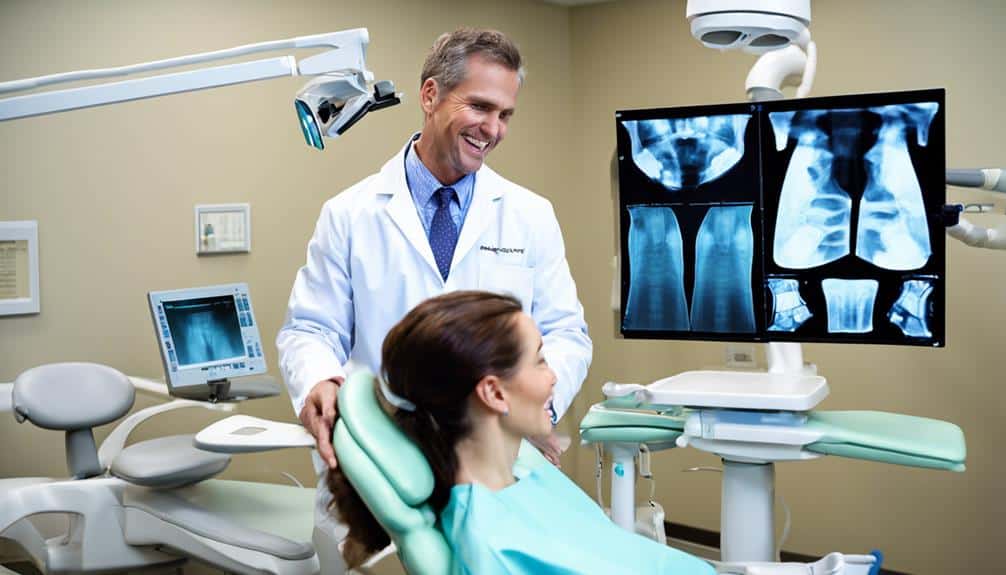
When you're scheduled for a dentist appointment, you'll likely need to factor in time for X-rays, which can add around 15 minutes to your overall visit.
The type of X-ray you need will impact the time required, and you might need a Full Mouth Series, a Bitewing Exam, or a Panoramic X-Ray Scan, depending on your oral health.
Understanding the time required for each of these options will help you plan your appointment and minimize wait times.
Full Mouth Series
You'll likely spend around 15-20 minutes in the dentist's chair for a full mouth series of dental X-rays, an essential diagnostic tool in modern dentistry. This thorough series consists of 18-20 individual X-ray images capturing all teeth, roots, and surrounding structures, providing a complete view of your oral health.
Here's what you can expect from a full mouth series:
- In-depth diagnosis: These X-rays help dentists detect cavities, gum disease, infections, and other oral health issues not visible during a visual exam.
- Personalized treatment planning: The images from a full mouth series aid in accurate diagnosis and treatment planning, ensuring you receive the best possible care for your unique needs.
- Recommended frequency: Full mouth X-rays are recommended every 3-5 years for new patients or as needed based on individual oral health conditions.
Bitewing Exam Time
A bitewing exam, which focuses on the crowns of your upper and lower teeth, typically takes around 5-10 minutes to complete. This type of dental X-ray helps your dentist detect cavities between your teeth and monitor bone levels. During the exam, you'll bite down on a piece of film or digital sensor to capture the images. This process is commonly done during routine dental checkups, and it's an essential part of your dental exam.
The bitewing exam is a quick and painless process that provides your dentist with valuable information about your oral health. The X-rays will show your dentist any signs of tooth decay or bone loss, allowing them to catch potential problems early on. Since it only takes a few minutes, you can expect to spend about 5-10 minutes on this part of your dental exam.
In total, your appointment may take anywhere from minutes to an hour, depending on the scope of your dental exam. But rest assured, this brief exam time is well worth it for the insight it provides into your oral health.
Panoramic X-Ray Scan
Your dentist will capture a detailed image of your mouth and jaw in just 10-30 seconds with a panoramic X-ray scan, providing an in-depth view of your teeth, jawbone, and surrounding structures in a single image. This efficient process allows your dentist to identify any potential issues with your teeth and gums, making it an essential step in your dental care.
Here's what you can expect during a panoramic X-ray scan:
- You'll stand still while the X-ray machine rotates around your head, capturing the image from multiple angles.
- The scan is painless and non-invasive, making it a comfortable experience for patients of all ages.
- The resulting image will provide your dentist with a thorough view of your oral health, helping them to detect issues such as impacted teeth, jaw disorders, and other potential problems.
Dental Exam and Diagnosis Time
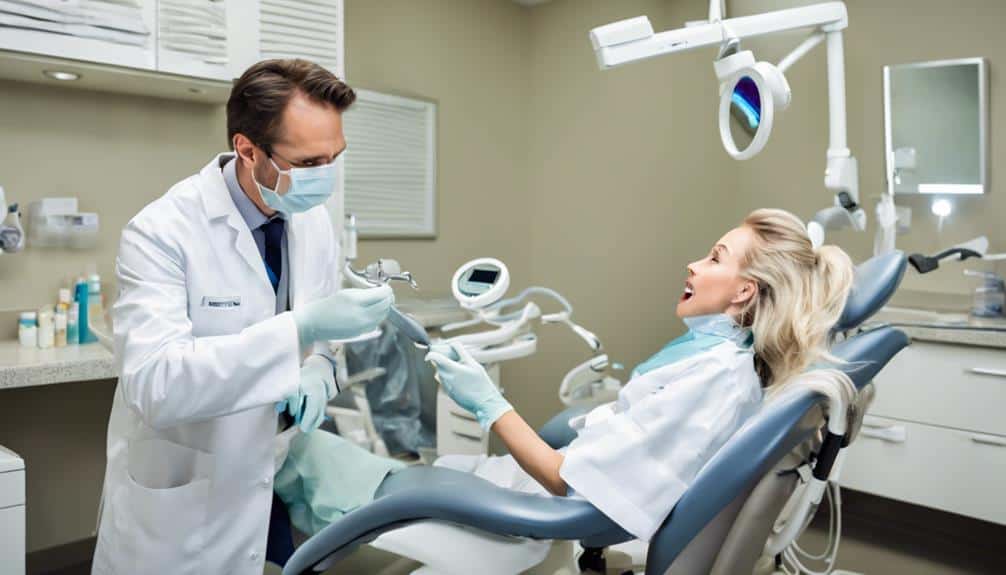
Inspecting your teeth and gums for signs of decay, gum disease, or other oral health issues, a dental exam and diagnosis typically takes around 30-45 minutes. During this time, your dentist will thoroughly examine your teeth, gums, and mouth to identify any potential problems. They'll check for signs of tooth decay, cracks, or wear, as well as examine your gums for signs of gingivitis or periodontitis.
If needed, X-rays may be taken, adding an additional 15 minutes to the appointment for a thorough assessment. The diagnosis time can vary based on the complexity of your case and any necessary follow-up procedures.
Regular dental exams are essential for early detection and prevention of dental problems. By catching issues early, you can avoid more extensive and costly treatments down the line. Your dentist will use this time to educate you on your oral health and provide personalized recommendations for improvement.
Treatment Plan and Discussion
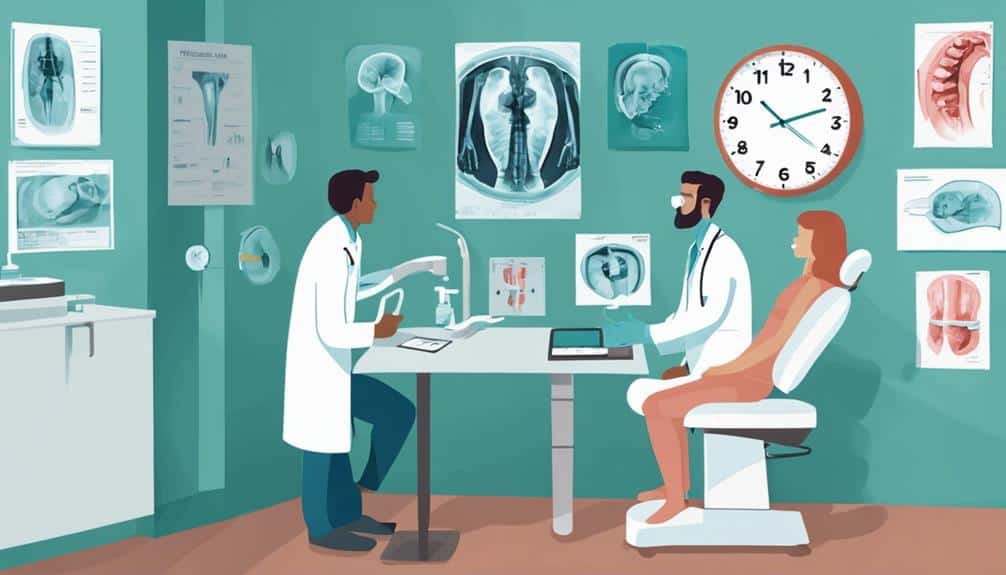
Once you've received a thorough examination and diagnosis, the next step is to discuss a personalized treatment plan, which typically takes around 10-15 minutes. During this time, your dentist will review and explain the recommended treatments and procedures based on your oral health needs. This is your opportunity to ask questions, express concerns, and collaborate with the dentist on the best course of action.
Here are some key aspects of the treatment plan discussion:
- You'll receive a clear explanation of the proposed treatments and procedures, including options, timelines, and cost estimates.
- You'll have the chance to ask questions and clarify any concerns you may have about your oral health.
- You'll work with your dentist to prioritize treatments, ensuring you're involved in the decision-making process and understand the next steps.
This discussion is vital in ensuring you understand your treatment plan and are comfortable with the proposed course of action. By taking an active role in your oral health, you'll be better equipped to maintain a healthy, happy smile.
Follow-Up Appointment Scheduling
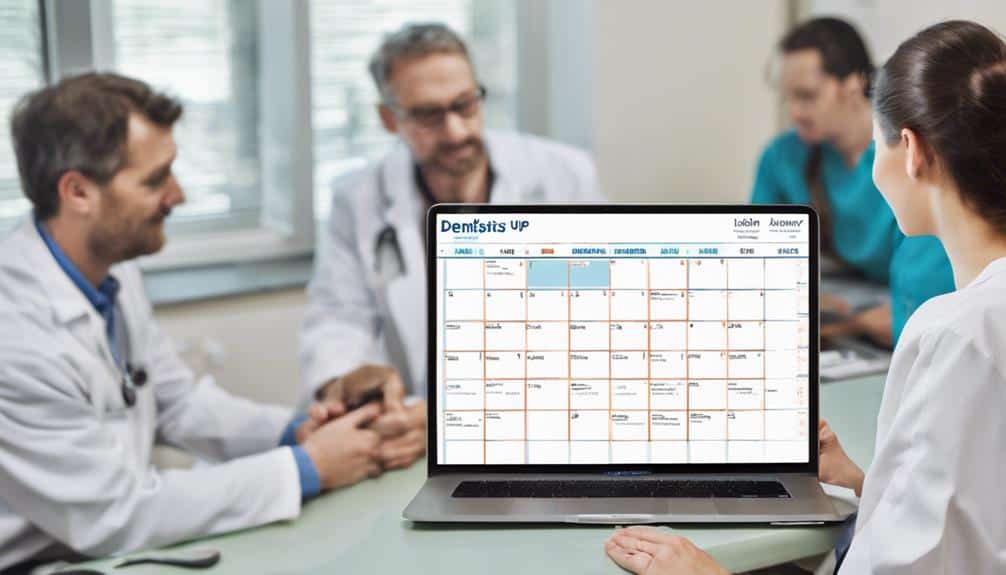
Based on your dentist's recommendations, follow-up appointments are scheduled to make sure you're on track with your treatment plan and to monitor your progress over time. The scheduling frequency of these appointments varies depending on the type of treatment or procedure you're undergoing. For instance, your dentist may suggest follow-up appointments every 3, 6, or 12 months to guarantee you're responding well to the treatment.
Regular follow-up visits are essential for monitoring your progress and ensuring excellent oral health. By adhering to the recommended follow-up schedule, you'll be able to maintain the effectiveness of your treatments and prevent any potential complications.
Additionally, follow-up appointments provide an opportunity for your dentist to make any necessary adjustments to your treatment plan, ensuring you receive the best possible care. By staying committed to your follow-up appointments, you'll be able to achieve the desired outcomes and enjoy a healthier, happier smile.
Frequently Asked Questions
How Long Is a Standard Dentist Appointment?
You're wondering how long a standard dentist appointment takes. Typically, it lasts between 30-45 minutes. This timeframe allows for a thorough examination and cleaning.
If you need X-rays, add 15 minutes to the total time. For a routine checkup and cleaning, plan for about an hour.
Don't worry, it's time well spent – regular dental check-ups are essential for preventing dental issues and maintaining good oral health.
How Long Do Most Dentist Appointments Last?
You might think dentist appointments drag on forever, but the reality is, they're often quicker than you think.
Most appointments last around 30-45 minutes, with X-rays adding an extra 15 minutes.
For a routine checkup and cleaning, you're looking at about an hour.
Of course, procedures like scaling and root planing can take longer, up to 2 hours, but for the most part, you'll be in and out in no time.
How Long Is a Dentist Visit?
When you wonder how long a dentist visit will take, you're likely thinking about the overall duration from start to finish. Typically, you'll spend around 30-45 minutes in the dentist's chair for a routine appointment.
However, additional procedures like X-rays, fillings, or treatments for periodontal disease can add 15 minutes to a couple of hours to your total visit time.
What's the Longest a Dentist Appointment Can Take?
Imagine sitting in the dentist's chair for an eternity – okay, maybe not that long, but you get the idea! Seriously, the longest a dentist appointment can take is typically around 2-3 hours for extensive procedures like deep cleanings or multiple fillings.
But, if you're getting complex treatments like root canals or oral surgeries, be prepared to spend more than 3 hours in the chair. Buckle up, because it's going to be a long ride!
